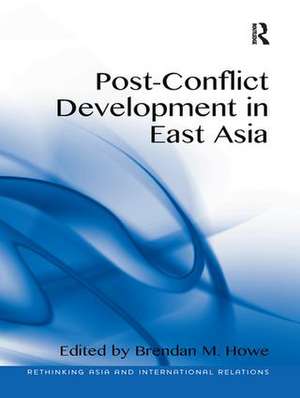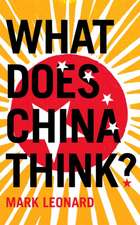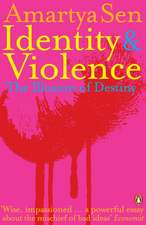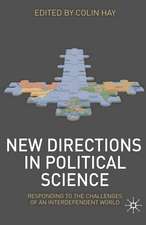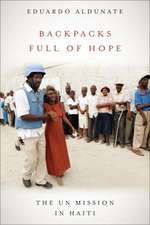Post-Conflict Development in East Asia: Rethinking Asia and International Relations
Autor Brendan M. Hoween Limba Engleză Paperback – 19 oct 2016
| Toate formatele și edițiile | Preț | Express |
|---|---|---|
| Paperback (1) | 469.34 lei 43-57 zile | |
| Taylor & Francis – 19 oct 2016 | 469.34 lei 43-57 zile | |
| Hardback (1) | 1058.38 lei 43-57 zile | |
| Taylor & Francis – 28 ian 2014 | 1058.38 lei 43-57 zile |
Din seria Rethinking Asia and International Relations
- 17%
 Preț: 258.91 lei
Preț: 258.91 lei -
 Preț: 383.71 lei
Preț: 383.71 lei -
 Preț: 476.86 lei
Preț: 476.86 lei - 17%
 Preț: 213.58 lei
Preț: 213.58 lei - 16%
 Preț: 241.15 lei
Preț: 241.15 lei -
 Preț: 469.34 lei
Preț: 469.34 lei -
 Preț: 381.72 lei
Preț: 381.72 lei - 26%
 Preț: 819.48 lei
Preț: 819.48 lei - 31%
 Preț: 764.20 lei
Preț: 764.20 lei -
 Preț: 388.64 lei
Preț: 388.64 lei -
 Preț: 402.94 lei
Preț: 402.94 lei - 17%
 Preț: 222.32 lei
Preț: 222.32 lei -
 Preț: 399.29 lei
Preț: 399.29 lei - 26%
 Preț: 764.36 lei
Preț: 764.36 lei - 18%
 Preț: 1058.38 lei
Preț: 1058.38 lei - 18%
 Preț: 1002.99 lei
Preț: 1002.99 lei - 12%
 Preț: 299.52 lei
Preț: 299.52 lei - 16%
 Preț: 241.15 lei
Preț: 241.15 lei -
 Preț: 390.37 lei
Preț: 390.37 lei - 17%
 Preț: 246.93 lei
Preț: 246.93 lei - 13%
 Preț: 297.99 lei
Preț: 297.99 lei - 31%
 Preț: 762.97 lei
Preț: 762.97 lei - 31%
 Preț: 767.38 lei
Preț: 767.38 lei -
 Preț: 463.58 lei
Preț: 463.58 lei - 26%
 Preț: 762.16 lei
Preț: 762.16 lei - 31%
 Preț: 765.45 lei
Preț: 765.45 lei - 26%
 Preț: 764.20 lei
Preț: 764.20 lei - 30%
 Preț: 847.86 lei
Preț: 847.86 lei -
 Preț: 383.33 lei
Preț: 383.33 lei - 25%
 Preț: 767.01 lei
Preț: 767.01 lei - 18%
 Preț: 1004.55 lei
Preț: 1004.55 lei - 18%
 Preț: 1109.18 lei
Preț: 1109.18 lei - 26%
 Preț: 679.92 lei
Preț: 679.92 lei
Preț: 469.34 lei
Nou
Puncte Express: 704
Preț estimativ în valută:
89.81€ • 94.02$ • 74.31£
89.81€ • 94.02$ • 74.31£
Carte tipărită la comandă
Livrare economică 07-21 aprilie
Preluare comenzi: 021 569.72.76
Specificații
ISBN-13: 9781138269972
ISBN-10: 1138269972
Pagini: 272
Dimensiuni: 156 x 234 x 14 mm
Greutate: 0.45 kg
Ediția:1
Editura: Taylor & Francis
Colecția Routledge
Seria Rethinking Asia and International Relations
Locul publicării:Oxford, United Kingdom
ISBN-10: 1138269972
Pagini: 272
Dimensiuni: 156 x 234 x 14 mm
Greutate: 0.45 kg
Ediția:1
Editura: Taylor & Francis
Colecția Routledge
Seria Rethinking Asia and International Relations
Locul publicării:Oxford, United Kingdom
Notă biografică
Brendan M. Howe, Ewha Womans University, Korea.
Recenzii
’In this timely book, a dozen top development and international relations scholars look in detail, country by country, at the reality behind East Asia’s economic miracle. Adopting a human-centred perspective, they distil concrete lessons from both good and bad governance in the region. Their rich analyses will be valued by many scholars and practitioners of East Asian development.’ Ian Holliday, The University of Hong Kong, Hong Kong
Cuprins
Part I Measuring Post-Conflict Development Success: Theory and Practice; Chapter 1 Introduction, Brendan M. Howe; Chapter 2 Security, Post-Conflict Development, and Good Governance in East Asia, Brendan M. Howe; Chapter 3 The Responsibility to Protect and Northeast Asia: The Case of North Korea, Boris Kondoch; Part II East Asian “Success” Stories and Caveats; Chapter 4 Aid to Build Governance in a Fragile State: Foreign Assistance to a Post-Conflict South Korea 1 This research was supported by the WCU (World Class University) program through the National Research Foundation of Korea funded by the Ministry of Education, Science and Technology of the Republic of Korea (Grant No.: R32–20077)., Jae-Jung Suh, Jinkyung Kim; Chapter 5 Human Security and Post-Conflict Development in Taiwan, Christian Schafferer; Chapter 6 Post-Conflict Developments in the Vietnamese Context—Reform, Conflict Resolution, and Regional Integration, Ramses Amer; Part III East Asian Obstacle Case Studies and Opportunities; Chapter 7 Human Security in Post-Cold War Cambodia, Sorpong Peou; Chapter 8 Oligarchic Rule, Ethnocratic Tendencies, and Armed Conflict in the Philippines, Nathan Gilbert Quimpo; Chapter 9 From Authoritarian to Democratic Models of Post-Conflict Development: The Indonesian Experience, Edward Aspinall; Part IV East Asian Initiatives in the Field of Human Security; Chapter 10 Working for Human Security: JICA’s Experience, Keiichi Tsunekawa, Ryutaro Murotani; Chapter 11 Korea’s Development Assistance in Fragile States: What Is at Stake?, Woojin Jung; Chapter 12 Human Security in Building the ASEAN Community, Carolina G. Hernandez;
Descriere
This volume critically assesses measurements of success in East Asian post-conflict development from a human-centered perspective. This involves a major re-evaluation of accepted accounts of domestic governance and international relations in East Asia from both a comparative and inter-disciplinary viewpoint. This book is rich in case studies and provides policy prescriptions for East Asian donors and actors in an effort to provide Asian solutions for Asian problems.
